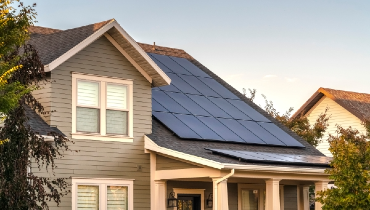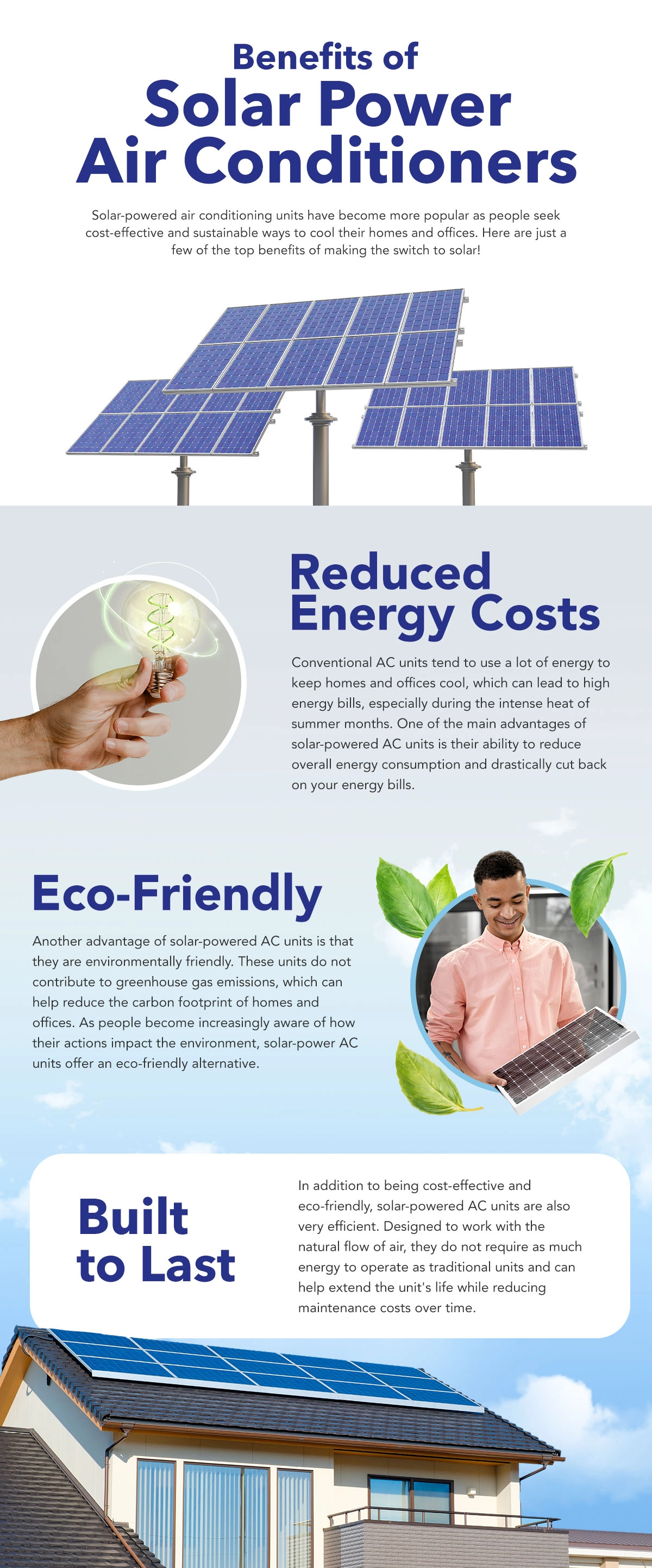Can I Run My Air Conditioner with Solar Panels?

Last updated: 9/16/2023
Yes, you can power an A/C system or supplement your power supply with solar panels.
The size of the unit and other factors will determine the number of panels required to power the system. Using the energy from a rooftop or ground-fixed solar array to power your AC can provide you with seasonal or even year-round energy savings (depending on where you live) while reducing your carbon footprint.
How to Run an AC Unit with Solar Panels
To run an AC unit with solar panels, you’ll need an inverter, battery, and of course, solar panels. Because solar panels generate DC (direct current power), and your home air conditioner utilizes AC (alternating current) power, you’ll need an inverter to convert this energy. From there, you can decide whether you want to power your AC through solar using an on-grid or off-grid system. Or, install an entirely solar-powered air conditioner.
Here the differences between these options are explained:
- On-grid system. For this option, panels and an inverter will be installed alongside your existing AC unit. Your panels will be connected to the grid, and therefore a battery is not needed for storage. However, if the power is out, your system will be too. With this option, you can choose to operate your AC during the day with solar energy from your array and then turn off your air conditioner at night, when it’s cooler. Or, use a backup battery to continue powering at night.
- Off-grid system. For this option, panels, an inverter, and a battery will be installed alongside your existing AC unit. Because this system isn’t connected to the grid, your battery will store additional power produced from your solar panels for use at night or on days when you have less direct sunlight.
- Solar-powered air conditioners. There are a few varieties including 1) DC (direct current), 2) AC (alternating current), and 3) hybrid. DC units are ideal for off-grid, as they’re direct-wired to your panels and can utilize battery operation—however if you plan to use your AC at night, an inverter and battery will be necessary. An AC unit will utilize an inverter to convert from DC to AC power and can be run with grid power if solar generation is low. A hybrid AC can be toggled back and forth to be run by the solar array (if the panels are producing well, like on a clear sunny day) and the grid (if they’re not).

What to Consider Before You Run an AC with Solar Power
A solar-powered AC is not only possible but a terrific way to save money on your monthly energy bills. Also, if your setup includes a backup battery to store your array’s solar energy, you can blackout-proof your home’s comfort.
Before deciding on powering your AC with your rooftop array, consider these factors:
- Commitment to the investment. Depending on whether you decide to install an entire solar power system for a home AC unit or install a new solar-powered air conditioner, the cost will differ. While both options will provide cost payback overall, typically an entire solar panel system will provide quicker ROI and allow you to power more appliances in your home with your own green energy.
- Location and climate. Hotter climates will require more power for your AC, and your solar panels will harvest more energy or less depending on where you live, say sunny Arizona versus an upper-Midwest state with more clouds and snow.
- Current AC tonnage and power consumption. Each AC unit will have a different tonnage, and depending on the size of your home, your AC will consume more or less power. This will affect how much solar power you need to power your AC.
Related Topic: Common Misconceptions about Going Green
How Many Solar Panels Do I Need to Run an AC Unit?
In order to run your AC on solar panels, you need to ensure they produce that same total amount of wattage. An average estimate would be to divide your AC wattage by the solar panel wattage you intend to use. Using the average household AC wattage of 3,500 watts, and a standard solar panel wattage, this formula would look something like 3,500 (w) / 250 w (panels) = 14 panels.
Despite the labeled wattage of the panels, in real life, variables include how much energy your solar panels can produce due to climate, area placement, type, model, electrical connection, and more.
Related Topic: How to Get Energy Efficiency Improvement Rebates
Stay Cool and Save Energy with Aire Serv
Looking to lower the carbon footprint of your home and make it more resilient in severe weather? We’re here to help. Contact your local Aire Serv technician to learn more about alternative cooling options for your home. Call us or schedule an appointment online to get started.
 Click to call
Click to call


